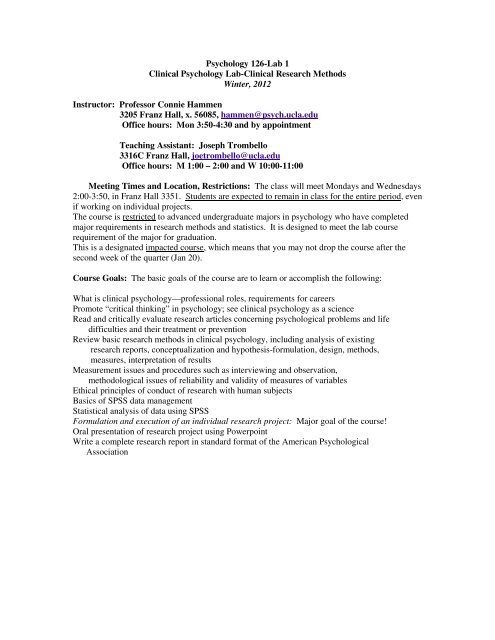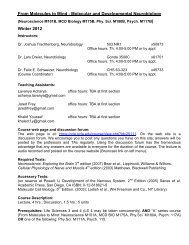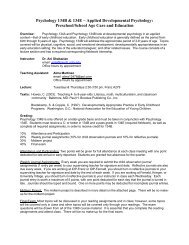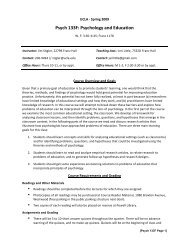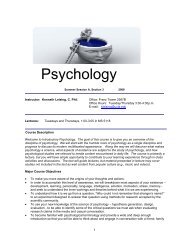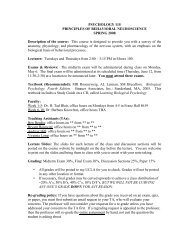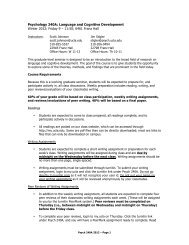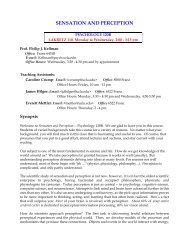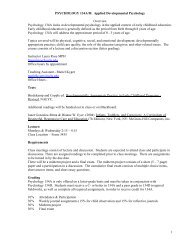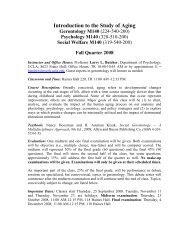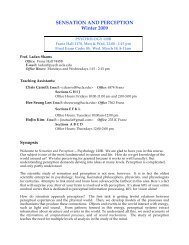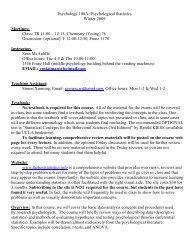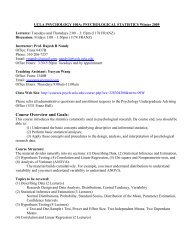Syllabus - Courses in Psychology - UCLA
Syllabus - Courses in Psychology - UCLA
Syllabus - Courses in Psychology - UCLA
You also want an ePaper? Increase the reach of your titles
YUMPU automatically turns print PDFs into web optimized ePapers that Google loves.
<strong>Psychology</strong> 126-Lab 1<br />
Cl<strong>in</strong>ical <strong>Psychology</strong> Lab-Cl<strong>in</strong>ical Research Methods<br />
W<strong>in</strong>ter, 2012<br />
Instructor: Professor Connie Hammen<br />
3205 Franz Hall, x. 56085, hammen@psych.ucla.edu<br />
Office hours: Mon 3:50-4:30 and by appo<strong>in</strong>tment<br />
Teach<strong>in</strong>g Assistant: Joseph Trombello<br />
3316C Franz Hall, joetrombello@ucla.edu<br />
Office hours: M 1:00 – 2:00 and W 10:00-11:00<br />
Meet<strong>in</strong>g Times and Location, Restrictions: The class will meet Mondays and Wednesdays<br />
2:00-3:50, <strong>in</strong> Franz Hall 3351. Students are expected to rema<strong>in</strong> <strong>in</strong> class for the entire period, even<br />
if work<strong>in</strong>g on <strong>in</strong>dividual projects.<br />
The course is restricted to advanced undergraduate majors <strong>in</strong> psychology who have completed<br />
major requirements <strong>in</strong> research methods and statistics. It is designed to meet the lab course<br />
requirement of the major for graduation.<br />
This is a designated impacted course, which means that you may not drop the course after the<br />
second week of the quarter (Jan 20).<br />
Course Goals: The basic goals of the course are to learn or accomplish the follow<strong>in</strong>g:<br />
What is cl<strong>in</strong>ical psychology—professional roles, requirements for careers<br />
Promote “critical th<strong>in</strong>k<strong>in</strong>g” <strong>in</strong> psychology; see cl<strong>in</strong>ical psychology as a science<br />
Read and critically evaluate research articles concern<strong>in</strong>g psychological problems and life<br />
difficulties and their treatment or prevention<br />
Review basic research methods <strong>in</strong> cl<strong>in</strong>ical psychology, <strong>in</strong>clud<strong>in</strong>g analysis of exist<strong>in</strong>g<br />
research reports, conceptualization and hypothesis-formulation, design, methods,<br />
measures, <strong>in</strong>terpretation of results<br />
Measurement issues and procedures such as <strong>in</strong>terview<strong>in</strong>g and observation,<br />
methodological issues of reliability and validity of measures of variables<br />
Ethical pr<strong>in</strong>ciples of conduct of research with human subjects<br />
Basics of SPSS data management<br />
Statistical analysis of data us<strong>in</strong>g SPSS<br />
Formulation and execution of an <strong>in</strong>dividual research project: Major goal of the course!<br />
Oral presentation of research project us<strong>in</strong>g Powerpo<strong>in</strong>t<br />
Write a complete research report <strong>in</strong> standard format of the American Psychological<br />
Association
Required Read<strong>in</strong>gs<br />
Barker, C., Pistrang, N., & Elliot, R. (2002). Foundations of quantitative measurement (Ch. 4),<br />
Research methods <strong>in</strong> cl<strong>in</strong>ical psychology, 2 nd edition. Chichester, England: John Wiley<br />
& Sons.<br />
Bersoff, D.M., & Bersoff, D.N. (1999). Ethical perspectives <strong>in</strong> cl<strong>in</strong>ical research. In P.<br />
Kendall, J. Butcher, & G. Holmbeck (Eds.), Handbook of research methods <strong>in</strong><br />
cl<strong>in</strong>ical psychology, 2 nd Edition (pp. 31-53). New York: Wiley & Sons, Inc.<br />
Compas, B. & Gotlib, I. (2002). Research methods <strong>in</strong> cl<strong>in</strong>ical psychology (Chapter 3).<br />
Introduction to cl<strong>in</strong>ical psychology. New York: McGraw-Hill.<br />
Kazd<strong>in</strong>, A. (1999). Overview of research design issues <strong>in</strong> cl<strong>in</strong>ical psychology. In P.<br />
Kendall, J. Butcher, & G. Holmbeck (Eds.), Handbook of research methods <strong>in</strong><br />
cl<strong>in</strong>ical psychology, 2 nd Edition (pp. 3-30). New York: Wiley & Sons, Inc.<br />
sections of APA Publication Manual-5 th Edition (2001).
Psych. 126 Graded Assignments<br />
1. Article critique (see next page of syllabus). You will select one of the articles we provide on<br />
some aspect of cl<strong>in</strong>ical psychology research, and write an analysis of its strengths and<br />
weaknesses. Based on lecture material, you will evaluate EACH SECTION: the Introduction<br />
(conceptualization, importance of topic), Methods (design, participants, measures, procedures),<br />
Results (you are not expected to understand the advanced statistics but should be able to<br />
understand chi-square, analysis of variance, and regression methods, and what was statistically<br />
significant and what wasn’t), and Discussion. You may discuss the article with your team, but<br />
your written work should be entirely your own.<br />
2-3 pages, double-spaced.<br />
Due January 23<br />
[15% of f<strong>in</strong>al grade]<br />
2. Introduction to your <strong>in</strong>dividual research paper (see Ground Rules page of syllabus). Each<br />
<strong>in</strong>dividual research project must have an Introduction written <strong>in</strong> APA format, cover<strong>in</strong>g at least 3<br />
relevant background research articles. The <strong>in</strong>troduction should <strong>in</strong>clude a statement of the issue<br />
and its importance, a critical review of at least 3 relevant research articles that provide<br />
background for your study, and a clear statement of the three hypotheses or questions your study<br />
will exam<strong>in</strong>e. This assignment is a draft of the <strong>in</strong>troduction section, a revision of which will be<br />
part of the f<strong>in</strong>al research report (Assignment 4).<br />
Approximately 3 pages double-spaced (not <strong>in</strong>clud<strong>in</strong>g the Reference List <strong>in</strong> APA format).<br />
Due February 8 (or sooner, if you can).<br />
[10% of f<strong>in</strong>al grade]<br />
2. Statistics problems. From the data set provided, you will be given an assignment requir<strong>in</strong>g<br />
SPSS. Details to be distributed later.<br />
2-3 pages, double-spaced<br />
Due February 15<br />
[15% of f<strong>in</strong>al grade]<br />
4. F<strong>in</strong>al Individual Research Projects. See Ground Rules for Individual Projects<br />
For all papers: Prepare a written report <strong>in</strong> APA format, with the standard sections:<br />
Abstract, Introduction, Methods, Results, Discussion, References (and Tables, Figures as<br />
required). The Introduction must <strong>in</strong>clude at least 3 research articles that are relevant to your<br />
research. The Methods must <strong>in</strong>clude a detailed statement of participants, design, procedures, and<br />
measures. The Results must <strong>in</strong>clude statistical analyses appropriate to your hypotheses. The<br />
Discussion must <strong>in</strong>clude a summary of results, their mean<strong>in</strong>g and implications,<br />
limitations of the study, and ideas for future research.<br />
F<strong>in</strong>al report is due Friday, March 16<br />
[40% of f<strong>in</strong>al grade]<br />
5. Prepare a PowerPo<strong>in</strong>t presentation. Brief presentation of your study cover<strong>in</strong>g <strong>in</strong>troduction,<br />
methods, results, and discussion. Give a 5-m<strong>in</strong>ute (maximum) oral presentation (practice and<br />
time it).<br />
Presentations will be scheduled for the 10 th (f<strong>in</strong>al) week of the class (March 12 or March 14)<br />
[10% of f<strong>in</strong>al grade]<br />
6. Class participation, attendance [10% of f<strong>in</strong>al grade].
Psych. 126—Cl<strong>in</strong>ical <strong>Psychology</strong> Lab<br />
W<strong>in</strong>ter, 2012<br />
Hammen<br />
Written Assignment—Individual Critique of Article<br />
Due: January 23<br />
Although you may work on the critique as a team, each paper will be an <strong>in</strong>dividual effort.<br />
1. your team will be given an article to read carefully and evaluate, based on class<br />
discussion of criteria.<br />
2. write a 2-3 page paper discuss<strong>in</strong>g the strengths and weaknesses of EACH section,<br />
Introduction, Methods, Results, and Discussion.<br />
2. With<strong>in</strong> the relevant sections, comment on the quality of the<br />
conceptualization, design, execution, analyses, and <strong>in</strong>terpretation, draw<br />
conclusions about the quality of the overall value of the paper.
Psych. 126—Cl<strong>in</strong>ical <strong>Psychology</strong> Lab<br />
W<strong>in</strong>ter, 2012<br />
Hammen<br />
Ground Rules for Individual Projects<br />
1. The projects are to be based on a topic <strong>in</strong> cl<strong>in</strong>ical psychology, and should <strong>in</strong>clude at least<br />
3 hypotheses or questions (could be one primary and two secondary, etc.)<br />
2. You have 3 choices for develop<strong>in</strong>g an <strong>in</strong>dependent project, as previously described:<br />
a). develop orig<strong>in</strong>al ideas, and collect data via questionnaires<br />
to be adm<strong>in</strong>istered <strong>in</strong> class and completed anonymously by class members<br />
[if selected, this option earns + extra credit]<br />
b). develop an experiment or “treatment” to be adm<strong>in</strong>istered to friends,<br />
volunteers [if selected, this option earns ++ extra credit]<br />
c). formulate and test hypotheses based on the Hammen class data set [no<br />
extra credit]<br />
3. You need not come up with orig<strong>in</strong>al theories that no one has ever thought of, but must go<br />
beyond obvious hypotheses (such as more girls than boys will be depressed).<br />
4. If you select choice (c) above, you may, with our approval, substitute key variables <strong>in</strong> the<br />
data set before conduct<strong>in</strong>g your study.<br />
5. Hypotheses will be tested with elementary statistics (basic <strong>in</strong>ferential statistics) and need<br />
not go beyond those reviewed <strong>in</strong> class. You may assume normality of the data (you need<br />
not test for this nor transform variables).<br />
6. Papers will not be graded on the basis of whether the results were significant. They will<br />
be graded on the <strong>in</strong>terest value and clarity of hypotheses, l<strong>in</strong>k to literature, critical<br />
th<strong>in</strong>k<strong>in</strong>g about relevant literature, appropriate variable selection, accurate and appropriate<br />
selection and execution of statistical analyses, accurate <strong>in</strong>terpretation of results, solid and<br />
thorough evaluation of limitations. They will also be graded on the basis of writ<strong>in</strong>g skill<br />
and adherence to standard APA article style.
Specific Tasks-Individual Projects<br />
1. read relevant articles for general background<br />
2. review elementary statistics<br />
3. familiarize yourself with depression data set and practice do<strong>in</strong>g analyses<br />
4. learn fundamentals of SPSS for use with any data set<br />
5. select your hypotheses, def<strong>in</strong>e project<br />
6. identify at least 3 articles relevant to Introduction; get them, read and review them<br />
for Introduction; write Introduction<br />
7. operationalize hypotheses <strong>in</strong> terms of variables and plan statistical analyses<br />
8. evaluate your data for completeness, reliability, etc. Write Method section.<br />
9. perform data analyses us<strong>in</strong>g SPSS; prepare appropriate tables, figures. Write<br />
Results section.<br />
10. draw conclusions about hypotheses, write Discussion section<br />
11. prepare PowerPo<strong>in</strong>t presentation of study<br />
12. complete <strong>in</strong>dividual write-up as article <strong>in</strong> APA format
Wk 1<br />
M 1/9<br />
LECTURE TOPIC LAB ACTIVITY READING GRADED ASSIGNMENT<br />
Intro to course<br />
Work on PowerPo<strong>in</strong>t selfpresentation<br />
What is cl<strong>in</strong>ical psychology?<br />
W 1/11 Student self-presentations Student self-presentations assign article for critique;<br />
form teams<br />
Wk 2<br />
M 1/16<br />
W 1/18<br />
Wk 3<br />
M 1/23<br />
Mart<strong>in</strong> Luther K<strong>in</strong>g Jr<br />
HOLIDAY<br />
What is good research? Critical<br />
th<strong>in</strong>k<strong>in</strong>g <strong>in</strong> cl<strong>in</strong>ical science<br />
Evaluat<strong>in</strong>g research articles:<br />
Introduction, Methods<br />
Evaluat<strong>in</strong>g research:<br />
Results, Discussion<br />
Teams work on critique<br />
Examples of previous class<br />
projects<br />
Teams work on critique<br />
a)Compas & Gotlib;<br />
b)Kazd<strong>in</strong><br />
W 1/25 Form<strong>in</strong>g good ideas ---Ground rules for course<br />
project assignment<br />
---Do<strong>in</strong>g electronic lit review<br />
---Beg<strong>in</strong> formulat<strong>in</strong>g project<br />
Wk 4<br />
M 1/30<br />
Measurement strategies.<br />
Types of measures-<strong>in</strong>terviews,<br />
questionnaires, observations<br />
---Develop own project<br />
Barker, Pistrang & Elliot<br />
(ch. 4)<br />
Critique paper<br />
Due 1/25<br />
W 2/1<br />
Evaluat<strong>in</strong>g measurespsychometric<br />
properties<br />
---Develop own project<br />
(do own read<strong>in</strong>gs for<br />
course project)<br />
(Should have own project<br />
basically formulated,<br />
designed)<br />
Wk 5<br />
M 2/6<br />
Statistical analyses<br />
Review of SPSS/statistics<br />
Work on statistics with Hammen<br />
data set
W 2/8<br />
Formulate & test hypotheses <strong>in</strong><br />
data set<br />
In class assignment—practice<br />
statistical analyses<br />
(do own read<strong>in</strong>gs for<br />
course project)<br />
Written draft of Intro (lit<br />
review)<br />
Wk 6<br />
M 2/13<br />
Ethical considerations<br />
Research ethics<br />
Practice statistical analyses Bersoff & Bersoff<br />
W 2/15<br />
work on project development<br />
APA format<br />
Work on projects, methods<br />
Wk 7 Presidents’ Day<br />
M 2/20 HOLIDAY<br />
W 2/22 In-Class Data Collection In-Class Data Collection<br />
Sections of APA style<br />
manual<br />
Statistics Assignment<br />
All research material to TA<br />
to copy for 2/22<br />
Wk 8<br />
M 2/27<br />
Work on projects, statistical<br />
analysis<br />
Work on projects, statistical<br />
analysis<br />
W 2/29<br />
Work on projects, statistical<br />
analysis<br />
Work on projects, statistical<br />
analysis<br />
Optional for feedback:<br />
Draft of <strong>in</strong>troduction and<br />
methods of your project<br />
Wk 9<br />
M 3/5<br />
Work on projects, statistical<br />
analysis<br />
Work on projects, statistical<br />
analysis<br />
W 3/7 Work on projects Work on projects, <strong>in</strong>terpretation<br />
Wk 10<br />
M 3/12<br />
W 3/14<br />
Individual presentations<br />
Individual presentations<br />
Individual presentations<br />
Individual presentations<br />
Oral presentations 3/12 or<br />
3/14<br />
Written research report due<br />
Friday, March 16


